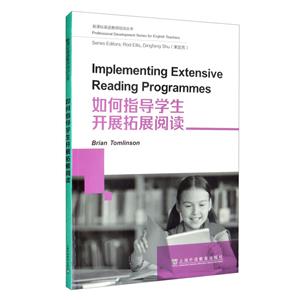-
>
心灵元气社
-
>
县中的孩子 中国县域教育生态
-
>
(精)人类的明天(八品)
-
>
厌女(增订本)
-
>
这样学习才高效/杨慧琴
-
>
心理学经典文丛:女性心理学
-
>
中国文化5000年
如何指导学生开展拓展阅读 版权信息
- ISBN:9787544666770
- 条形码:9787544666770 ; 978-7-5446-6677-0
- 装帧:一般胶版纸
- 册数:暂无
- 重量:暂无
- 所属分类:>>
如何指导学生开展拓展阅读 内容简介
在中小学英语教学中,拓展阅读是培养语感、拓宽知识面、丰富词汇量、增强语言运用能力的有效途径之一。《英语教师培训丛书:如何指导学生开展拓展阅读》作者Brian Tomlinson是国际知名教材研究专家,国际教材开发协会(MATSDA)创始人兼现任主席。该书依托作者本人及其团队成员有关指导学生开展拓展阅读的研究,结合众多具体的教学实践,从不同角度对开展拓展阅读的重要性和必要性进行了介绍和分析,涉及拓展阅读的价值、阅读者的学习目的和方式、教师的职责、辅助活动和评估方式等方方面面,并在书后附有推荐阅读书目和术语表等。全书简明易懂,例证丰富,实操性强,可为中小学英语教师指导学生开展拓展阅读提供宝贵的经验和启示。
如何指导学生开展拓展阅读 目录
Chapter 1 Introduction
Chapter 2 What Is Extensive Reading?
Chapter 3 What Extensive Readingls Not?
Chapter 4 What Do the Learners Read?
Chapter 5 How Do the Learners Read?
Chapter 6 What Does the Teacher Do?
Chapter 7 What Activities Can Support Extensive Reading?
Chapter 8 Can Extensive Reading Be Assessed?
Chapter 9 What Is the Value of Extensive Reading?
Chapter 10 Ways of Implementing an Extensive Reading Programme
Chapter 11 Problems in Implementing an Extensive Reading Programme
and Ways to Overcome Them
Chapter 12 Compromises in the Extensive Reading Classroom
Conclusion
Further Reading
Glossary
References
如何指导学生开展拓展阅读 节选
Ideally when learners are reading extensively they are paying willing and full attention to what the text is saying to them and they are absorbed by it both affectively (i.e. through their emotions) and cognitively (i.e.through their thoughts). Only then will the learners gain the full benefits of extensive reading and gradually acquire more language and develop the ability to use it effectively for communication. Engagement is not easily achieved and is only attainable if what the learner is reading is comprehensible (i.e. they can understand enough to gain enjoyment or information), is interesting, is connected to their experience or aspirations and grabs and maintains their attention. I have found that texts which are both familiar and novel often have a potential for engagement. This is especially true ifthe topic, location or theme is one the learner is familiar with but the writer is adding a different perspective or a different example to their treatment ofit. For example, I was once surprised to find that students in Nigeria were engaged by a text about building igloos in the Arctic. It seems that the use oflocal, freely available resources in the Arctic (i.e. snow) to build and frequently replace 'houses' was very similar to the use of trees to build and replace huts in Nigerian villages.I have also found that narrative texts are potentially more engaging than expository or descriptive texts, especially ifthey are funny, exciting, moving or bizarre, and that writers who are personal, informal or provocative are more likely to engage than those who are impersonal, formal and neutral.Bizarre texts in particular (i.e. texts which are interestingly strange) often have great potential for engagement, especially if they are partially familiar and partially bizarre (as, for example, in a text about a human being living on the moon or an alien from Mars living in Beijing). The potential of a text to engage is different for each learner as they have each had a different experience of the world. They might share a culture, a first language and an environment but ultimately each learner is different and will be engaged by different texts. This means that it is very important that a wide variety of texts are available for learners to select from and that each learner reads what they want to read. It is also important that each reader is not made to fmish reading a text which they thought would be appealing but which turns out not to be as engaging as was expected. In such a case the learner should be allowed to replace the text with another one oftheir choice which looks as though it has greater potential for engagement. My advice to learners is, 'Ifyou aren't enjoying your reading, don't give up. Keep reading a little longer as your text might become much more interesting. However, if you carry on reading and you're still not enjoying it, don't feel you have to finish. You can change your text for another one which seems more interesting.' The importance oflearner engagement means that a class oflearners in which each learner is reading a different extensive text is more likely to profit the Jearners than one in which they are all reading the same text,especially if the learners have no say in the selection of that text. If the learners are all reading the same text it is less likely that all the learners will be engaged and more likely that the teacher will be tempted to control the pace at which the learners read and to test them on what they have read. It also means that there might not be enough money left in the budget to build a library of extensive readers and the learners might never experience true extensive reading. Sometimes, though, I have found myselfin institutions where all the students in a class reading the same extensivereader was the norm. ……
- >
月亮与六便士
月亮与六便士
¥18.1¥42.0 - >
推拿
推拿
¥12.2¥32.0 - >
中国历史的瞬间
中国历史的瞬间
¥16.7¥38.0 - >
苦雨斋序跋文-周作人自编集
苦雨斋序跋文-周作人自编集
¥6.9¥16.0 - >
中国人在乌苏里边疆区:历史与人类学概述
中国人在乌苏里边疆区:历史与人类学概述
¥20.6¥48.0 - >
名家带你读鲁迅:朝花夕拾
名家带你读鲁迅:朝花夕拾
¥10.5¥21.0 - >
巴金-再思录
巴金-再思录
¥14.7¥46.0 - >
人文阅读与收藏·良友文学丛书:一天的工作
人文阅读与收藏·良友文学丛书:一天的工作
¥14.7¥45.8




















